
ACTA GASTRO-ENTEROLOGICA BELGICA
Scope & Guideline
Pioneering Research for Better Digestive Health
Introduction
Aims and Scopes
- Gastrointestinal Disorders:
Research on various gastrointestinal disorders, including Irritable Bowel Syndrome (IBS), inflammatory bowel diseases (IBD), and functional gastrointestinal disorders, emphasizing diagnosis, management, and treatment outcomes. - Hepatology:
Studies focusing on liver diseases, including hepatitis, cirrhosis, and hepatocellular carcinoma, with an emphasis on novel treatment modalities and patient outcomes. - Endoscopic Techniques and Innovations:
Exploration of endoscopic procedures, innovations, and their effectiveness in diagnosing and treating gastrointestinal conditions, including advancements in endoscopic surgery. - Immunological and Metabolic Disorders:
Research on the immunological aspects of gastrointestinal diseases and the metabolic dysfunctions associated with liver conditions, highlighting the interplay between the gut and systemic health. - Clinical Guidelines and Consensus Statements:
Publication of consensus guidelines and recommendations for the management of various gastrointestinal and liver diseases, reflecting the latest evidence-based practices.
Trending and Emerging
- Impact of COVID-19 on Gastroenterology:
Research focusing on the implications of the COVID-19 pandemic on gastrointestinal practices, patient care, and the management of chronic conditions is increasingly prevalent, reflecting the ongoing relevance of this global health crisis. - Microbiome and Gut Health:
An emerging interest in the role of the gut microbiome in health and disease is evident, with studies exploring its impact on conditions like IBS, IBD, and liver disease, highlighting the importance of gut health in overall wellbeing. - Personalized Medicine and Genetic Factors:
There is a growing emphasis on personalized medicine, including the role of genetic factors in gastrointestinal diseases, which aims to tailor treatments based on individual patient profiles and responses. - Integrated Care Approaches:
The journal is increasingly publishing studies that advocate for integrated care approaches, combining gastroenterology with other specialties like nutrition, psychiatry, and metabolic health to improve patient outcomes.
Declining or Waning
- Traditional Pharmacological Treatments:
There seems to be a decline in studies focusing solely on traditional pharmacological treatments for gastrointestinal diseases, as the journal increasingly emphasizes innovative therapies and multidisciplinary approaches. - Historical Case Reports:
The number of purely historical case reports is decreasing, with a noticeable shift towards studies that incorporate larger cohort analyses or systematic reviews, indicating a trend towards more robust evidence generation. - Surgical Techniques in Gastroenterology:
While surgical techniques remain relevant, there appears to be a waning focus on traditional surgical methods in favor of minimally invasive techniques and endoscopic innovations, reflecting advances in technology.
Similar Journals
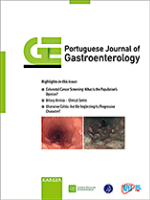
GE Portuguese Journal of Gastroenterology
Empowering Global Collaboration in GastroenterologyThe GE Portuguese Journal of Gastroenterology, published by KARGER, is a prominent platform in the field of gastroenterology, providing a vital forum for the dissemination of high-quality research since its establishment. With an open access model implemented in 2012, the journal ensures that emerging findings in gastrointestinal health are readily accessible to a global audience, facilitating the exchange of critical knowledge among researchers, practitioners, and students alike. Based in Switzerland, this journal has earned a respected position within the academic community, currently holding a Q3 ranking in the gastroenterology category for 2023, alongside a Scopus rank of #113 out of 167 in its field. Spanning converged years from 2014 to 2024, the GE Portuguese Journal of Gastroenterology aims to bridge gaps in research and practice, fostering collaboration and innovation across diverse areas within the discipline. Authors and readers alike benefit from the journal's commitment to advancing knowledge and practice in gastroenterology.
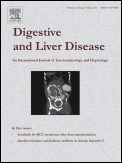
DIGESTIVE AND LIVER DISEASE
Pioneering insights for a healthier tomorrow.DIGESTIVE AND LIVER DISEASE is a prominent journal published by Elsevier Science Inc, dedicated to advancing the field of gastroenterology and hepatology. With an ISSN of 1590-8658 and an E-ISSN of 1878-3562, this journal has established itself as a significant resource within the academic community, especially considering its Q2 ranking in both gastroenterology and hepatology categories as of 2023. Spanning from 2000 to 2024, the journal presents a diverse array of peer-reviewed articles, clinical studies, and review papers that explore the latest advancements and research findings in digestive and liver diseases. The journal's robust impact, reflected in its Scopus rankings—40th out of 167 in gastroenterology and 28th out of 82 in hepatology—highlights its critical role in shaping practices and understanding in these vital areas of medicine. With open access options available, DIGESTIVE AND LIVER DISEASE aims to make high-quality research accessible to a wider audience, thereby encouraging collaboration and innovation. Researchers, healthcare professionals, and students alike will find valuable insights into the complex mechanisms, diagnostics, and therapeutic strategies pertinent to digestive and liver health.

Gastroenterology Research
Advancing gastroenterology through innovative research.Gastroenterology Research is a prominent scholarly journal dedicated to advancing the field of gastroenterology. Published by ELMER PRESS INC, this journal serves as a vital platform for disseminating innovative research, clinical findings, and comprehensive reviews that explore the complexities of the gastrointestinal system. With an ISSN of 1918-2805 and an E-ISSN of 1918-2813, it reaches a global audience of researchers, healthcare professionals, and students eager to contribute to or keep abreast of the latest developments in gastroenterology. Though details such as the H-index and Scopus rankings are currently unspecified, the journal's commitment to quality and impact in the medical research community is evident. Gastroenterology Research aims to foster collaboration and knowledge sharing among experts, ultimately improving patient care and outcomes within this critical area of health science. Explore the cutting-edge studies published within its pages and engage with a community passionate about the investigation and treatment of gastrointestinal diseases.
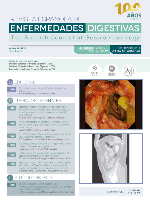
REVISTA ESPANOLA DE ENFERMEDADES DIGESTIVAS
Unveiling insights into digestive diseases.REVISTA ESPANOLA DE ENFERMEDADES DIGESTIVAS, a pivotal Open Access journal published by ARAN EDICIONES, S A, has been at the forefront of advancing the field of gastroenterology since its inception in 1990. With a robust commitment to disseminating high-quality research, the journal provides a platform for researchers, clinicians, and students to share innovative findings and insights concerning digestive diseases. The journal is characterized by its Q3 ranking in both Gastroenterology and Miscellaneous Medicine categories, indicative of its significant contributions to these fields, and is positioned within the 36th percentile of Scopus rankings for medicine related to gastroenterology. Based in Spain, REVISTA ESPANOLA DE ENFERMEDADES DIGESTIVAS has embraced the Open Access model since 2004, ensuring that its articles are readily available to a global audience without financial barriers. The journal not only supports academic discourse but also plays a crucial role in improving clinical practices and health outcomes related to digestive health.

Translational Gastroenterology and Hepatology
Connecting Research to Real-World Solutions in Hepatology.Translational Gastroenterology and Hepatology, published by AME Publishing Company, stands as a pivotal platform for advancing the understanding and treatment of gastrointestinal and liver diseases. With its focus on translational research, this journal aims to bridge the gap between laboratory discoveries and clinical applications, thus fostering improvements in patient care. Although specific metrics like H-Index and Scopus ranks are currently unavailable, the journal is committed to maintaining high standards of scholarly communication and excellence. As an open-access publication, it ensures that valuable findings are readily accessible to a global audience, promoting collaboration and innovation among researchers, clinicians, and healthcare professionals invested in gastroenterology and hepatology. The journal's dedication to disseminating groundbreaking research makes it an essential resource for those seeking to stay at the forefront of these ever-evolving fields.

Pediatric Gastroenterology Hepatology & Nutrition
Advancing pediatric health through innovative research.Pediatric Gastroenterology Hepatology & Nutrition is a pivotal academic journal published by the Korean Society of Pediatric Gastroenterology & Nutrition, focusing on the critical fields of pediatric gastroenterology, hepatology, and nutrition. Located in South Korea, this journal aims to disseminate high-quality research, review articles, and clinical studies to advance knowledge and practice in the care of children with gastrointestinal and nutritional disorders. With a Converged Years span from 2012 to 2024 and categorized in the Q2 and Q3 quartiles in 2023 across multiple related fields, the journal holds a significant position within the academic community, reflecting its impactful contribution to the discipline. Although currently not open access, the journal ensures that content is accessible to a broad audience through various institutional subscriptions. The journal appeals to researchers, healthcare professionals, and students alike, providing an essential platform for the exchange of innovative ideas and research findings aimed at improving pediatric patient care.

Gastroenterology
Unveiling the Latest in Digestive Health ResearchGastroenterology, published by W B Saunders Co-Elsevier Inc, is a premier journal dedicated to advancing the knowledge and practice within the fields of gastroenterology and hepatology. Established in 1945 and covering a wide range of topics related to digestive health, this journal holds a distinguished position in the academic community, as evidenced by its impressive Q1 status in both Gastroenterology and Hepatology categories, and its high rankings (4th in both disciplines) in Scopus, placing it in the top percentile for scholarly impact. With its commitment to publishing high-quality research, reviews, and clinical studies, Gastroenterology provides an essential resource for researchers, healthcare professionals, and students seeking cutting-edge insights that inform clinical practices and enhance patient care. Although it does not currently offer open access, the journal continues to serve as a vital platform for disseminating meaningful research that shapes the future of digestive disease management.
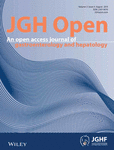
JGH Open
Empowering the Future of Gastrointestinal MedicineJGH Open is a prominent open-access journal dedicated to advancing knowledge in the fields of Gastroenterology and Hepatology, published by WILEY. Since its inception in 2017, the journal has served as a crucial platform for researchers, professionals, and students to disseminate innovative research findings and clinical insights. With an impact factor and Scopus rankings reflecting its steady growth—ranking in the 3rd quartile for both Gastroenterology (Q3) and Hepatology (Q3)—JGH Open is positioned within the competitive landscape of medicine. Its commitment to open access enhances the visibility and accessibility of high-quality research, ensuring that significant advancements in understanding diseases of the gastrointestinal tract and liver reach a broad audience. With a focus on collaboration and dissemination of knowledge, JGH Open aims to contribute to the global discourse and improve outcomes in gastrointestinal health.

JOURNAL OF PEDIATRIC GASTROENTEROLOGY AND NUTRITION
Transforming pediatric care with groundbreaking research.Journal of Pediatric Gastroenterology and Nutrition is a premier academic journal published by Wiley, focusing on the critical intersection of pediatric gastroenterology and nutrition. Established in 1982, this journal has been at the forefront of research and clinical practices for over four decades and continues to contribute invaluable insights to the fields of pediatrics and gastrointestinal health, boasting a Q1 ranking in Pediatrics, Perinatology and Child Health and a Q2 ranking in Gastroenterology as of 2023. The journal features a comprehensive array of original research, review articles, and clinical studies aimed at improving the understanding and management of pediatric gastrointestinal disorders and nutrient imbalances. Edited with expertise, the Journal of Pediatric Gastroenterology and Nutrition serves as an essential resource for clinicians, researchers, and students dedicated to advancing the well-being of children with digestive health issues. Readers can access the journal's impactful research studies through traditional subscriptions.
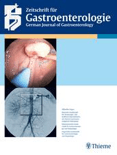
ZEITSCHRIFT FUR GASTROENTEROLOGIE
Exploring the Frontiers of Gastroenterology ResearchZEITSCHRIFT FUR GASTROENTEROLOGIE, published by GEORG THIEME VERLAG KG, stands as a notable journal in the field of gastroenterology since its inception in 1971. With an ISSN of 0044-2771 and an E-ISSN of 1439-7803, this journal focuses on advancing knowledge and research in gastrointestinal health. Operating from Germany, its contributions span various aspects of gastroenterology, providing a platform for both established and emerging scholars to share their findings. As of 2023, ZEITSCHRIFT FUR GASTROENTEROLOGIE is ranked in the Q3 quartile in Gastroenterology and Q4 in Medicine (miscellaneous), reflecting its critical yet developing role in the academic community. Despite its current Scopus rank of #117 out of 167 in the gastroenterology category, the journal aims to foster innovative research and discussions vital for tackling contemporary challenges in gastrointestinal medicine. While it does not offer open access, the journal's extensive archival rigor ensures that pertinent studies remain accessible to professionals and academicians seeking to deepen their understanding and engage with evolving clinical practices.